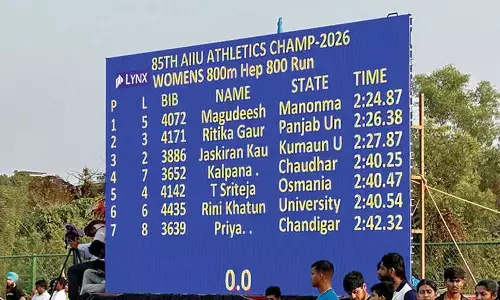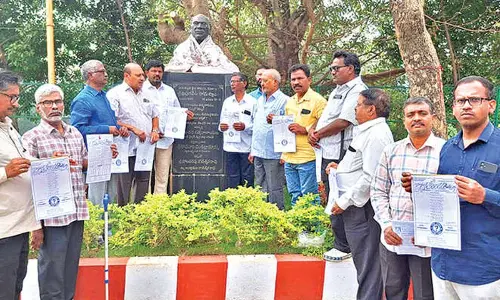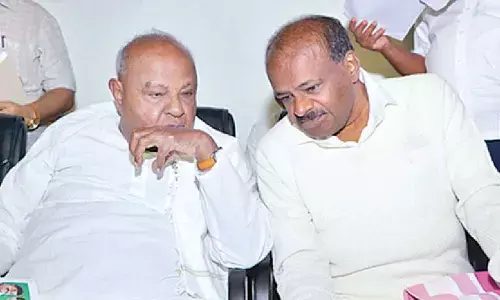New year to usher in new focus

New year to usher in new focus, Aam Aadmi Party’s firm, Niloptal Basu. The hung assembly Delhi voters elected promised protracted stint of President’s rule keeping the assembly in suspended animation.
The uncertainty is eventually over. The hung assembly Delhi voters elected promised protracted stint of President’s rule keeping the assembly in suspended animation. This was natural; given the paradigm shift in Delhi’s political landscape which had been traditionally characterised by a bipolar polity. The uncertainty was further exacerbated by Aam Aadmi Party’s firm assertion in the run up to the elections neither will they support nor take support from any of the traditional rivals Congress or BJP. And even after, they continued with the same refrain.
But thankfully, all that has changed. Badly mauled by Delhi electorate, the Congress, as if in reflex action, thought it better to extend unconditional support to the Kejriwal-led AAP for forming the government. This was a smart move on two counts. Firstly, this was a step in tune with the prevailing direction of change. And more importantly, this would keep BJP out of office; in a state which they coveted and sorely missed. Especially, with the Modi campaign literally thirsting for blood, an AAP government in Delhi would be constant reminder about the elusive Modi wave which had pollsters go haywire.
But, Congressmen are after all Congressmen! And in their present form they can at best be ‘smart by half’. Therefore, familiar noise about the support being conditional and striking back if the new government works against the interests of their party has started doing the rounds. But with a little political common sense, they would have realised that any funny behaviour which would appear to be destabilising the government after having written that letter of support to the Lieutenant Governor is only courting further disaster.
However, the Congress chose not to drive home the advantage of their initial wisdom and absented from the huge turnout in Ramlila Maidan which was there to witness the unique oath taking by Kejriwal’s cabinet.
But, on the other hand, BJP has fared far worse. As always, they have shown themselves as ‘bad losers’. How far removed they remain from the political reality became apparent with their volte face after the initial effort to take a moral high ground! To start with, BJP refused the offer of forming the government on the ground that they were the single largest party in the assembly; presumably as an expression of their commitment to principled politics. And they followed this with a gamble! They dared AAP to form the government with the assurance that in the event this was accepted, they would not do anything to upset the arrangement. But lo and behold! As and when, the AAP decided to form the government with Congress support, they did a somersault claiming this was a conspiracy to keep them out of power! Former BJP president Nitin Gadkari went a step further; actually alleging that an industrialist had acted as go-between to seal the ‘deal’ for Congress and AAP.
In retrospect, the decision to form the government was much trickier for the AAP. Politics of principles has been USP for the AAP; and predictably that has widely fired the imagination of the aam aadmi. And this was the basis which firmed up earlier AAP resolve on support-neither as a giver nor as a taker. Given this context, it was difficult for AAP to take the offer of support for forming the government.
But, to be fair, the AAP attempted to go back to the people to elicit their opinion on this crucial decision. They have dutifully shared the outcome of this exercise in the public domain before finalising their decision. But perhaps, this was not necessary. Cold electoral statistics reveals that while Congress was routed in Delhi; but BJP apart from failing to capitalise on this electoral marginalisation of the erstwhile ruling party ended up with a drop in its vote share compared to 2008. So clearly, it is only the AAP which has gained support of the people and which ought to be the basis which legetimises the party’s decision.
And, this brings us to the most pertinent question. What accounts for this stunning debut of AAP? Frustrated by unemployment and diminishing opportunities, ever-increasing prices of everyday commodities, the government’s tilt towards the private sector and MNCs in its rush to increase growth rate, total disconnect with people and, above all, corruption in high places and bribery in daily life made men, women and youth relate to the battle against corruption. There were several occasions when major disquiet of the people poured out on the streets notably in the wake of the gruesome ‘Nirbhaya’ episode.
The decision of Kejriwal to form the AAP was seen as credible direction.The subsequent efforts to take up the issues of water and electricity helped reinforce the peoples drift away from the two established parties. Constituency-wise identification of issues and their articulation further galvanised this trend. Therefore, contrary to the sense of surprise which seems to have struck corporate media at large, for those who believed that what the country and its aam aadmi needs today, is not just a change in the leadership of the government; but an altogether alternative set of policies; if anything Delhi electorate has demonstrated this political reality. And, precisely because of this both Congress and BJP appear clueless in comprehending what has hit them!
But, that is not to say that AAP is without challenges. Kejriwal and his colleagues have evolved from a civil society to a political party. There is a fundamental difference; from merely posing pointed questions on governance, it has to be answerable and provide answers. No party, particularly those in government can escape this responsibility.AAP is no exception.
Whether water or electricity or essential commodity prices and their access to people at affordable rates – are ultimately issues which interest them. But their delivery demands coherent policy formulation.
Today, Vijay Mallya of Kingfisher and Royal Challenger infamy is tweeting “True power of the people manifests itself” on AAP’s ascendancy. Can aam aadmi’s plight be redeemed without reversing the extant neo liberal policies? Can Mallya’s excitement and aam aadmi’s hopes be reconciled?
The irony is obvious. The very same mainstream media which were posing the electoral build up as a battle royal between NaMo and RaGa, today are relentless is singing praise to AAP stunner. But, in this high season of hope, cynicism has no room. One can only hope 2014 will usher in new focus on people-centric paradigm and not continue with current market and growth driven priorities.

















